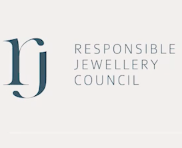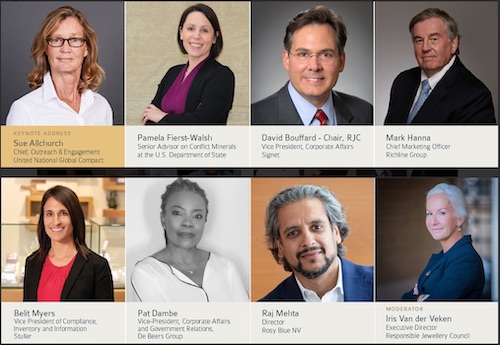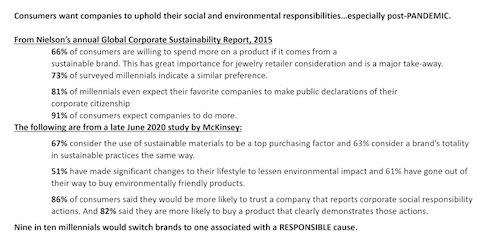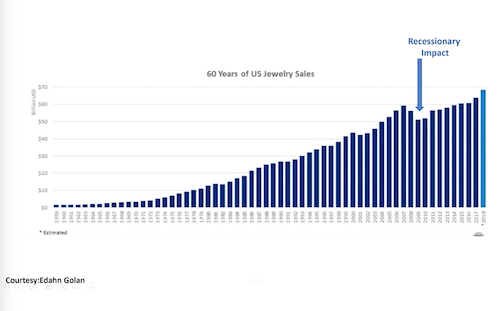Articles and News
What’s Next For The Jewelry And Watch Supply Chain? | August 18, 2020 (0 comments)

London, UK—As the global COVID-19 pandemic creates uncertainty for the world, the Responsible Jewellery Council asks, “We wonder what the next ‘normal’ will be, and how can we can prepare for it? As U.N. Secretary-General António Guterres asked, ‘How can we build back better?’”
Broad and transformative changes across the supply chain will be key to getting both jewelry businesses and the economy back on track, says the RJC, which hosted a leadership panel at last week’s JCK Virtual 2020 event. “Leading with Purpose: The Jewellery Industry Beyond COVID-19” addressed the relationship between responsible business and resilient business.
The importance of promoting and integrating responsible business practices and sustainability in the jewelry industry remains essential to consumer confidence, especially among conscious consumers, said Iris Van der Veken, executive director of the Responsible Jewellery Council. Van der Veken moderated a discussion featuring views from both the public and private perspective. Speakers were:
- Sue Allchurch, chief of outreach & engagement, United Nations Global Compact (Keynote Address)
- Pamela Fierst-Walsh, senior advisor on conflict minerals at the U.S. Department of State
- David Bouffard, vice president of corporate affairs, Signet and chair of the RJC
- Mark Hanna, chief marketing officer, Richline Group
- Belit Myers, vice president of compliance, inventory and information, Stuller
- Pat Dambe, vice president of corporate affairs and government relations, De Beers Group
- Raj Mehta, director, Rosy Blue NV
“COVID-19 is spreading human suffering, destabilizing the global economy, and upending the lives of billions of people around the globe,” said Van der Veken, noting that its impact could cost the equivalent of 195 billion jobs worldwide. “As we heard from Bruce Cleaver, CEO of De Beers and a founding RJC member, consumers’ top needs are security, stability, and control. How do we support that through sound, responsible business practices? What is the solution for a more prosperous society?”
Sue Allchurch of the United Nations said, “The thing COVID is really showing us is interconnectivity. Take Africa, for instance: before any shutdowns on the continent, it’s expected to lose $2.5 billion in global supply chain exports just because of shutdowns in the U.S., China, and Europe.”
She also pointed to COVID’s extreme impact by gender: 70% of healthcare workers are women and 60% of “informal” (i.e. unofficial) employees are women. Both are at extremely high risk.
“Stakeholders understand that sustainable business is the way forward. 88% of CEOs know the whole system needs to change.”
Brands and products that are sustainable are growing 6% faster than all others and driving both consumer and investor interest, she said, pointing to Boston Consulting Group data that shows 24 out of 25 Environmental and Social Governance (ESG) funds are providing higher returns than non-ESG funds and businesses with high ESG tend to attract more capital and have higher stock performance.
Pamela Fierst Walsh of the U.S. Department of State pointed out that COVID hasn’t changed anything, it’s magnified it.
“If you asked the day before COVID, I would have said things like threat finance and human rights concerns are all throughout the jewelry supply chain. The day after COVID, my answer is still the same. We still have all those concerns. The supply chain did not get more secure just because everyone’s more concerned about COVID.”
Supply chains have been stress-tested in ways nobody would ever want, but we have to deal with it, she said. “We have a chance to build them stronger and make sure that what we’re working with really is as strong as we thought it was.” For instance, the artisanal sector, always vulnerable to bad actors, is particularly vulnerable now, she said.
“The price for gold was $2000 at last measure, but the price for artisanal miners is plummeting. Somebody is profiting off that delta and it’s not the artisanal miners. That says something about the existence of threat finance concerns in that chain and in sister chains. The threats are still there, the bad guys aren’t giving up, the deleterious forces are not going to get better on their own. It’s the responsibility of good actors to drive these changes.”

The Responsible Jewellery Council panel of speakers.
De Beers’ Pat Dambe addressed the value of public/private partnerships, such as De Beers with her native Botswana, where today the key focus is on the environment, inclusion of women, focusing on youth, and looking beyond life-of-mine.
David Bouffard highlighted Signet’s focus on responsibility at the retailer level. The company’s corporate social responsibility involves three areas, environmental, social (diversity and inclusion), and governance reporting, he said. Signet is RJC founding member and 96% of the value of products it sources also come from RJC members.
“For inclusion, we’ve taken a quite progressive public stance through our support of NAACP’s Legal Defense Fund. In the LGBTQ+ community through our support of GLAAD, and for those impacted by COVID, through our support of an organization called Heart To Heart.” Signet also just launched an internal business resource group called Black Employee Network in an effort to help mentor black employees for career growth. And for two consecutive years Signet has been selected by Bloomberg’s Gender Equality Index. 42% of its executive leadership, 45% of its board, and over 70% of its field leaders are women.
Mark Hanna said the pandemic has highlighted the need for sustainable practices and the industry won’t move back. “Thisisn’t about sustainability practicesof our companies, it is about the sustainability ofour companies,” he said. “We all know we have to be compliant by law, but we’re increasingly getting more responsible by choice,”
His sentiment was echoed by Raj Mehta of Rosy Blue in India. “Trust is crucial to consumer confidence and therefore, even in difficult times like now, it is important to maintain supply chain integrity.”
Richline reacted well to COVID because of the preparation that was there before. “It’s not like we expected to have a test, but when we were tested we did well,” said Hanna. But the supply chain is in trouble and it will take time to recover. Even simple things like transportation difficulties from mines, such as was highlighted in a recent World Gold Council report, has an impact.
He then presented some key consumer perspectives. “It’s not just about ethics, it’s about economics for all of us. I think we’ve all been heightened in our evaluation of our expenses, but in the end, it’s about the consumer.
The first set of data was from 2015 but Hanna says it’s still the most comprehensive research he’s seen--and some of the numbers were verified again just last year by Forbes. “Every single piece of research we’ve looked at, responsible practice is important to somewhere north of 60% of consumers."

Mark Hanna presented key findings about the importance of responsible business practices to consumers.
“Throughout all recessions, the jewelry industry has come back. What’s different about this one is that it’s not just about livelihoods, it’s about livelihoods and lives.”

Mark Hanna used this chart from noted industry analyst Edahn Golan to show how jewelry is remarkably resilient after a recession.
At Stuller, things look different now, even down to PPE on the factory floor, said Belit Myers. Being a mid-market player, Stuller has a diverse supply chain and is looking at how its vendors are addressing the pandemic and what they’re doing for employees.
“Nobody has been immune to resource challenges. How is that impacting them and their ability to service us and supply us? Can they meet the standards we require?” she asked.
Myers believes supply chains will be challenged through next year and agility will be key. “Given the fact that travel has been suspended at least through the end of the year, we’re doing a lot of this virtually, but we’re talking to our partners more than ever. I see that evolving as this new normal continues to evolve.”
Finally, Van der Veken asked panelists what the future of our industry looks like? The consensus, as expressed by Rosy Blue’s Raj Mehta, was that a collective redoubling of our industry’s efforts to demonstrate its commitment to do right by society and the planet is required.
“We all need to look beyond our own supply chains and help to raise standards together, as an industry.”







